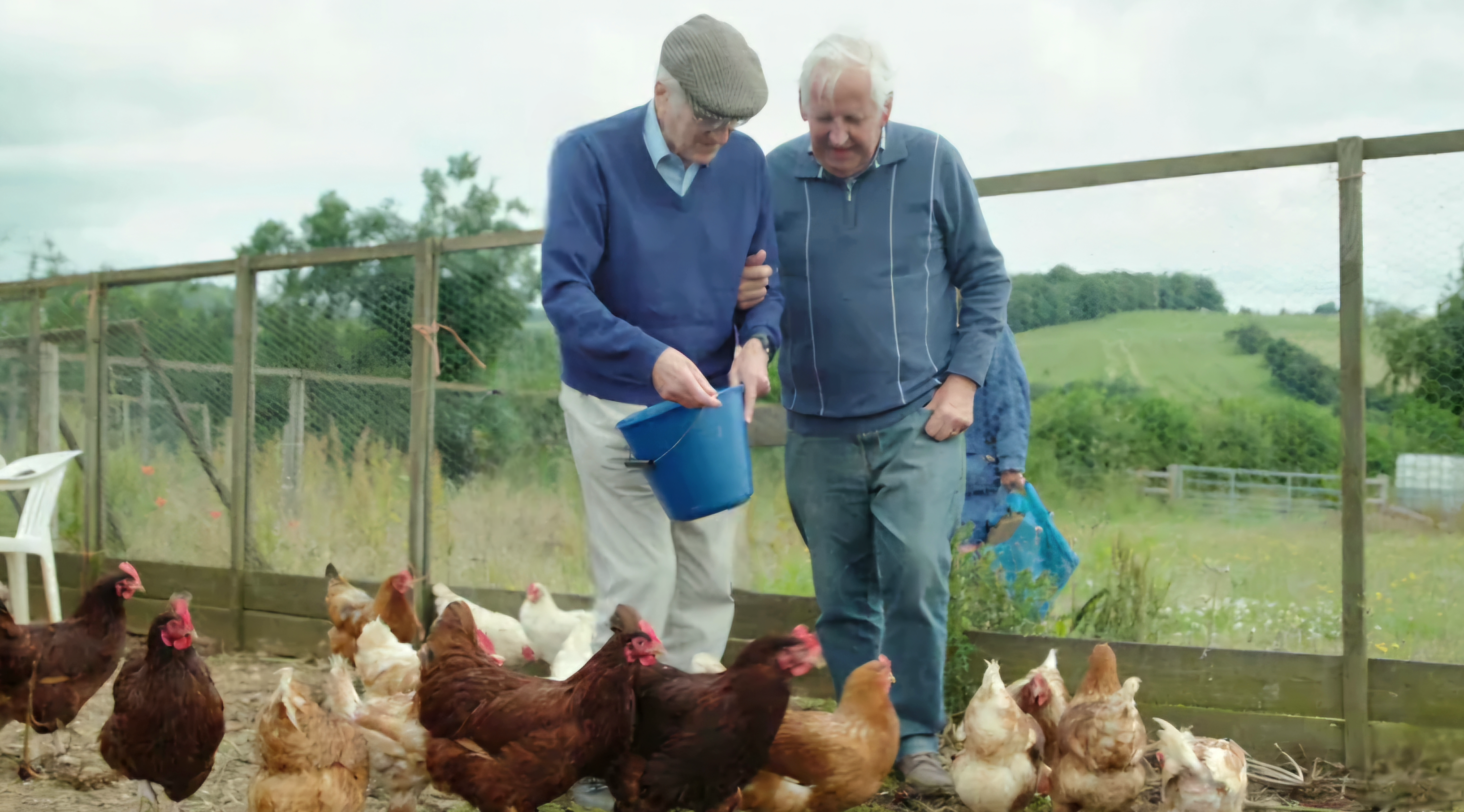
Photo credit: Screenshot of the cover photos of the YouTube post "Social Farms & Gardens - Care farming for dementia and older people"
An elderly person plants bushes; others feed farm animals and tend gardens. Laughter is shared over tea. People take walks together in the country, interact with farm animals, and paint a work bench. At first glance, it’s simply people in the United Kingdom enjoying the countryside and doing typical farm chores.
Meanwhile, in the Netherlands, “Four days a week, Kees Oranje’s 81-year-old mother Paula gets up and goes off to work on a farm in the neighboring village of Brielle, just west of Rotterdam.”
“Depending on the day, Paula might feed the chickens, assist with chores, or help prepare hot lunches,” writes Elizabeth Hewitt in the article “In Holland People With Dementia Can Work on a Farm” on the Reasons to be Cheerful website.
Taking a closer look reveals an intentional collaboration addressing the desire to reduce reliance on institutions for dementia care, alongside the need for farming to become more multifunctional to offset increased costs and declining food prices. It was the late 1990s, and the people of the Netherlands were finding ways to provide individuals with disabilities an avenue for meaningful participation in society.
Fast-forward to today, and care farming is an established part of society in the Netherlands with organized initiatives in the U.K. as well. Care farms, also called social farms, combine agricultural work with therapeutic or social services, offering mental health support, rehabilitation, and/or community-building activities through farming.
They exist in the U.S. as well but are not supported by government funding and are not as widely available. They usually focus on a specific population such as those recovering from addiction, veterans, or people with dementia, including Alzheimer’s Disease. I am covering this unique form of community because September is World Alzheimer’s Month, raising awareness about all forms of dementia.
This is society creating community at its best.
The brief YouTube post Social Farms & Gardens - Care farming for dementia and older people (5:40 mins) spotlights the community benefits of care farms in the U.K, making the point that connecting with nature and others is beneficial to mental health. Research supports these assertions.
“Studies in Norway and the Netherlands found that people with dementia at care farms tended to move more and participate in higher-intensity activities than those in traditional care, which can help with mobility in daily life and have a positive impact on cognition. Dementia is often linked to social isolation, and care farms were found to boost social involvement, especially among those who wouldn’t opt for traditional assistance options. Spending time outdoors in nature, often part of a day on a care farm, can also improve well-being among people with dementia. Farms are not only good for individuals, their families also benefit: studies find caregivers experience less guilt when their loved ones are supported by services they consider to be nurturing and fulfilling,” writes Hewitt.
My notes for this post include large sections of Hewitt’s well-researched article. I can’t improve on her well-presented depiction of care farms, so instead I’ll provide you with some of the lovely quotes she includes and implore you to invest 6 minutes to read her entire 2022 article.
“What the person needs is not only care,” Oranje [Paula’s daughter] says. “A person needs emotions, too.”
“We don’t focus on what’s missing, but what is still left,” says Arjan Monteny, cofounder of Boerderij Op Aarde, “what is still possible to develop in everybody.”
“I think the realization that people still like to do useful things, useful work, and to be valued and contribute is really important,” Jan Hassink, Wageningen University researcher says.
Source: “In Holland People With Dementia Can Work on a Farm” by Elizabeth Hewitt.
Hewitt makes the point that “Common to many people with dementia is a desire to not only participate in society, but contribute to it.” Care farms are helping to do that, increasing social value for their communities.
You likely don’t have a care farm in your community if you are outside of the U.K. or Netherlands, but they are growing in popularity in the U.S. You can, however, help those with dementia connect with nature and others. See the Golden Connection Challenge below for some suggestions.
Golden Connection Challenge:
Share information on care farms and social farms with the families of those you know who might benefit.
That could be as simple as providing the link to this blog post or as involved as looking for local opportunities and sharing the information with the family.
You might even consider planning an outing to a farm or some time out in nature for a person with dementia this month. Invite their family as well as they know best how to ensure the person processes the outing for the best possible experience.
I’d love to hear about your experiences with a comment here or email me using the contact form.
Bonus Golden Connection Challenge:
Share a playlist from the era a person with dementia will recognize; music is a powerful way to connect people with dementia to meaningful memories as mentioned in the Social Farms & Gardens - Care farming for dementia and older people YouTube post.
Head over to Mix Tape Journey as well to access a playlist for some soul therapy yourself this month and learn more about the power of music and memory. This month’s playlists include songs from the perspectives of people with dementia, caregivers, and loved ones. The first one Remember Who I Was (Side A) has already dropped.
I’d love to hear about your experiences with a comment here or email me using the contact form.
Check out the following YouTube Channel for more information on care farming in the U.K.
For more information on care farming in the United States, consult this website:
